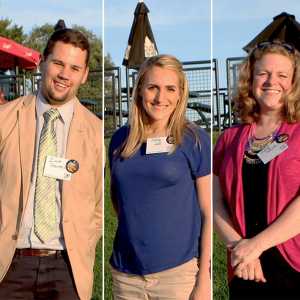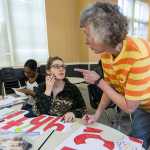Forrest Griek ’00, ’02 is the principal of Tacoma’s Browns Point Elementary and a national “Emerging Leader” in education. [Photo Courtesy of Tacoma Public Schools]
PLU Alumnus Named National Emerging Leader in Education
TACOMA, WASH. (July 28, 2015)- It’s safe to say Forrest Griek ‘00, ’02 loves being at school.
Currently the principal of Tacoma’s Browns Point Elementary, Griek has spent his career serving in a variety of positions at schools throughout the South Sound, including Todd Beamer High School in Federal Way, where he served as Activities Director; Foster High School in Tukwila, where he served as an assistant principal; and Thomas Jefferson High School in Federal Way, where he was Dean of Students and later assistant principal.
When Griek is not working at a school, he is often attending school. After graduating from PLU with a Bachelor of Arts in Education, he has gone on to earn a Master of Education (also from PLU), principal certification, superintendent certification and a Doctorate of Education.
As part of the 46-member 2015 Class of Emerging Leaders, Griek will receive exclusive access to a pool of grant funds designed to support innovative approaches to whole-child education and to help emerging leaders grow professionally.
The 2015 Emerging Leader class is diverse both professionally and regionally. The class includes educators from 21 states, Indonesia and Pakistan who hold a variety of roles, including principal, teacher, consultant, curriculum director and administrator.
Griek is excited about the new opportunity and says several opportunities he took advantage of while a student at PLU shaped his passion for education.
What does it mean to you to have been selected as a national Emerging Leader in education?
I’m humbled to be selected and honored to represent Tacoma Schools and Browns Point Elementary. As an ASCD Emerging Leader, I will have access to professional growth opportunities that reach beyond our state. I hope to use this new knowledge to improve my practice and better serve, students, staff and parents/guardians. I strongly believe that if you want to be a great leader you have to reflect, admit your mistakes and continue to learn to do better for/by your students.
Fortunately, I work with a district that believes this too and a staff committed to learning and supporting each other. Simply put, it has really hit home for me to be selected as an ASCD emerging leader.
You spent nearly a decade serving at the high-school level prior to transitioning to an elementary school. What motivated that transition; what do you enjoy about elementary schools, and what do you miss about high schools?
I have had a unique journey that has brought me full circle. I actually started out in elementary education at PLU and student-taught in fourth grade at Arlington Elementary in Tacoma. I have always had this core belief in early childhood education; it is the starting point for high school and beyond. At the time of my transition, my number one motivator was my family. I had reached a time in my life that I was struggling to find balance, and I needed something to give.
As a high-school principal you are running a small city and oftentimes not getting home until 8, 9 or even past 10 p.m. This doesn’t work, especially when you have three kids under 6. My other motivating factor was Tacoma Schools and their leaders. I was inspired by what Tacoma Schools were doing in my community. District leaders were walking the talk and getting the results that kids deserve.
I enjoy kids and schools in general; leadership is leadership at any level, but what I love about elementary is the joy that you see on students’ faces when they learn. I see this every day from students, staff and parents at the elementary level. What I miss most about high school is the fast pace and high-stakes nature of that world. You are constantly running and trying to do what is best for kids under some of the most challenging circumstances.
What are one or two ways that your Doctorate of Education and superintendent certification inform how you lead Browns Point Elementary on a day-to-day basis?
I learned a lot about myself when I earned my doctorate and superintendent certification. I think this helped me be more aware of my flaws as a leader, which is something I try to work on each day. The experience also made me more knowledgeable of the “big-picture” and how systems such as school districts function and influence the day-to-day operations of schools.
This has allowed me to have a broader understanding of what is needed district-wide in relationship to what is needed at the building level. Schools in a large school system are not successful if they are not aligned with the mission/vision of their district. It takes the school and district working together to be truly successful.
Do you have a bit more time to strategize, review best practices, etc. during the summer months while students are on vacation?
I have more time in the summer to strategize and do some planning, for example, fine tuning the master schedule and planning some professional development, but I really try to spend most my time in the summer on my own growth as a leader.
I attend conferences and other professional development opportunities, reflect, write and take time to recharge and reconnect with family and friends. I think it’s important that the majority of school planning and work happens when my staff is around; their voice and support make all the difference.
What do you think is a strength of PLU’s Education program?
Its direct connection with schools and commitment to “real” teaching and leading experiences. They understand that you don’t learn to teach or lead by just reading a book or doing research. They get that you have to work in the trenches and practice the art of teaching and leading from day one.
Is there a PLU experience, course or faculty member that stands out to you as profound in shaping your passion for education or the direction you took in the education field?
On one end, I competed in Track and Cross Country for PLU. This experience taught me how to endure and essentially compete day in and day out for results. Our work as educators is not done at the end of the day; you often don’t get long-term results until years down the road — it is a relentless process.
When I ran for PLU it was no different. I would run a 70-mile week to race 3 miles as fast as I could. Sometimes you would set a personal record, other days you fainted from exhaustion. On the other end of my PLU experiences, I remember asking the School of Education to place me in a diverse school that would make me a better person and teacher. That happened, and it was one of the toughest experiences of my teaching career.
My class was challenging, and they taught me how to survive and fight for what is right. This would have never happened if PLU had not listened to my dreams as an educator. Another memorable experience was learning about PLU’s commitment to service. I think this was really the capstone of my education at PLU. I remember coming out of my undergrad and having a clear sense of purpose for social justice and serving others.



































